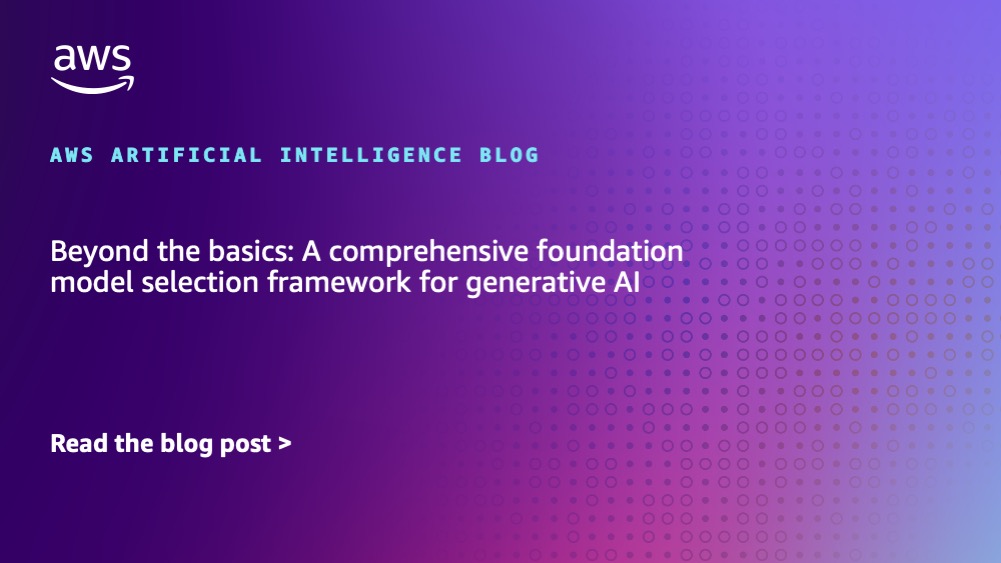Artificial Intelligence
Category: Generative AI
Exploring the Real-Time Race Track with Amazon Nova
This post explores the Real-Time Race Track (RTRT), an interactive experience built using Amazon Nova in Amazon Bedrock, that lets fans design, customize, and share their own racing circuits. We highlight how generative AI capabilities come together to deliver strategic racing insights such as pit timing and tire choices, and interactive features like an AI voice assistant and a retro-style racing poster.
Build character consistent storyboards using Amazon Nova in Amazon Bedrock – Part 1
The art of storyboarding stands as the cornerstone of modern content creation, weaving its essential role through filmmaking, animation, advertising, and UX design. Though traditionally, creators have relied on hand-drawn sequential illustrations to map their narratives, today’s AI foundation models (FMs) are transforming this landscape. FMs like Amazon Nova Canvas and Amazon Nova Reel offer […]
Unlocking the future of professional services: How Proofpoint uses Amazon Q Business
Proofpoint has redefined its professional services by integrating Amazon Q Business, a fully managed, generative AI powered assistant that you can configure to answer questions, provide summaries, generate content, and complete tasks based on your enterprise data. In this post, we explore how Amazon Q Business transformed Proofpoint’s professional services, detailing its deployment, functionality, and future roadmap.
Natural language-based database analytics with Amazon Nova
In this post, we explore how natural language database analytics can revolutionize the way organizations interact with their structured data through the power of large language model (LLM) agents. Natural language interfaces to databases have long been a goal in data management. Agents enhance database analytics by breaking down complex queries into explicit, verifiable reasoning steps and enabling self-correction through validation loops that can catch errors, analyze failures, and refine queries until they accurately match user intent and schema requirements.
Deploy Amazon Bedrock Knowledge Bases using Terraform for RAG-based generative AI applications
In this post, we demonstrated how to automate the deployment of Amazon Knowledge Bases for RAG applications using Terraform.
Document intelligence evolved: Building and evaluating KIE solutions that scale
In this blog post, we demonstrate an end-to-end approach for building and evaluating a KIE solution using Amazon Nova models available through Amazon Bedrock. This end-to-end approach encompasses three critical phases: data readiness (understanding and preparing your documents), solution development (implementing extraction logic with appropriate models), and performance measurement (evaluating accuracy, efficiency, and cost-effectiveness). We illustrate this comprehensive approach using the FATURA dataset—a collection of diverse invoice documents that serves as a representative proxy for real-world enterprise data.
Detect Amazon Bedrock misconfigurations with Datadog Cloud Security
We’re excited to announce new security capabilities in Datadog Cloud Security that can help you detect and remediate Amazon Bedrock misconfigurations before they become security incidents. This integration helps organizations embed robust security controls and secure their use of the powerful capabilities of Amazon Bedrock by offering three critical advantages: holistic AI security by integrating AI security into your broader cloud security strategy, real-time risk detection through identifying potential AI-related security issues as they emerge, and simplified compliance to help meet evolving AI regulations with pre-built detections.
Meet Boti: The AI assistant transforming how the citizens of Buenos Aires access government information with Amazon Bedrock
This post describes the agentic AI assistant built by the Government of the City of Buenos Aires and the GenAIIC to respond to citizens’ questions about government procedures. The solution consists of two primary components: an input guardrail system that helps prevent the system from responding to harmful user queries and a government procedures agent that retrieves relevant information and generates responses.
Beyond the basics: A comprehensive foundation model selection framework for generative AI
As the model landscape expands, organizations face complex scenarios when selecting the right foundation model for their applications. In this blog post we present a systematic evaluation methodology for Amazon Bedrock users, combining theoretical frameworks with practical implementation strategies that empower data scientists and machine learning (ML) engineers to make optimal model selections.
Accelerate intelligent document processing with generative AI on AWS
In this post, we introduce our open source GenAI IDP Accelerator—a tested solution that we use to help customers across industries address their document processing challenges. Automated document processing workflows accurately extract structured information from documents, reducing manual effort. We will show you how this ready-to-deploy solution can help you build those workflows with generative AI on AWS in days instead of months.









